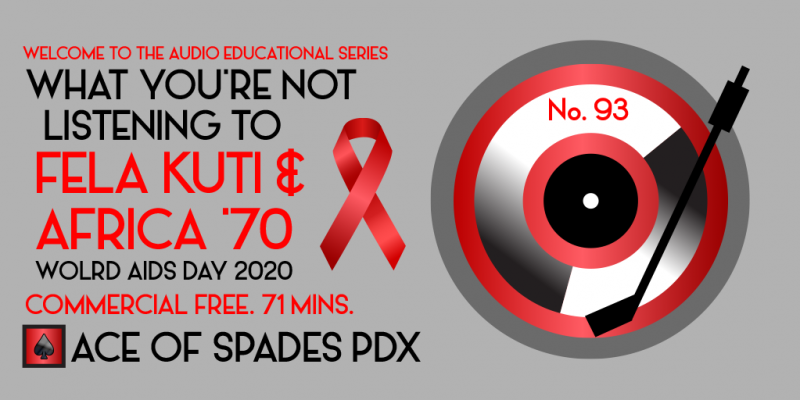Podcast: Play in new window | Download | Embed
December 1st is the 32nd annual observance of World AIDS Day. As a tribute to people worldwide who we have lost to this disease or are still living with it, we dedicate this show to you and to our spotlight artist this week, Fela Kuti. #AIDS #HIV #WAD2020 #Africa #Nigeria #Highlife #afrobeat

Olufela Olusegun Oludotun Ransome-Kuti, or simply Fela, as he was commonly known, was a Nigerian multi-instrumentalist, musician, composer, human rights activist, and political maverick. He died from AIDS at the age of 58 in 1997.

During his lifetime, he was simultaneously married to 27 different women, proclaimed independence from his home country of Nigeria, founded an independent state, ran a commune, started a political party and was often jailed and beaten by the police, including one raid by armed forces that killed his mother.
“The music of Africa is big sound: it’s the sound of a community.”
Fela Kuti
He created an entire music genre called Afrobeat, a combination of traditional Ghanain music, jazz, highlife, funk, psychedelic music and chants, fused with percussion, call-and-response vocals, and complex, interacting rhythms. His songs were often very long by traditional Western pop standards, typically running between 10 to 20 minutes each, and released over 45 albums of original material. He primarily sang in English, sometimes peppered with Yoruba, the language of his native tribe.

For the uninitiated, it sounds like a mix between jazz fusion and world music. Song topics were often highly political, which was a direct influence of his learning of the Black Power movement of the late 1960’s during a performing and recording residency in Los Angeles and as a critique of the new governments of many African nations that were equally as or even more oppressive than their former colonizers.

Why I chose Fela Kuti for this year’s program: What we often forget or fail to address in terms of HIV/AIDS prevention, education, outreach and support: That the majority of the people in the world who have been affected by the disease are straight and Black. It’s time to use science as the focus, not stigma, through an approach that uses intersectionality as a supportive tool.
Fight HIV/AIDS, not people with HIV/AIDS.
First Part
- Let’s Start (live), 1971, Fela with Ginger Baker Live!
- Gentlemen, 1973, Gentlemen
- Witchcraft, 1969, The ’69 Los Angeles Sessions
Second Part
- Water Got No Enemy, 1975, Expensive Shit
- Shuffering and Shmiling (Vocal), 1978, Shuffering and Shmiling
Finale
- Zombie, 1977, Zombie
Love to you all.
Ben “Daddy Ben Bear” Brown Jr.
Host, Show Producer, Webmaster, Audio Engineer, Researcher, Video Promo Producer and Writer
“Copyright Disclaimer Under Section 107 of the Copyright Act 1976, allowance is made for ‘fair use’ for purposes such as criticism, comment, news reporting, teaching, scholarship, and research. Fair use is a use permitted by copyright statute that might otherwise be infringing. Non-profit, educational or personal use tips the balance in favor of fair use.”
